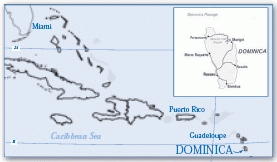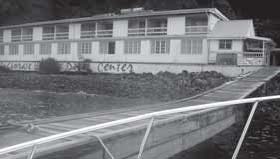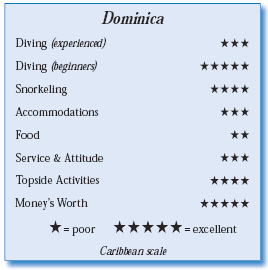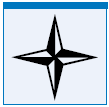Dominica, Caribbean's JewelContents of this Issue: Atlantis Dive Resorts, Philippines British Expert Calls Short Courses "Madness" Deeper into Diving Comprehensive Second Edition Last Chance to be Published in the 2007 Chapbook! The Dive Industry and the Internet, Part V Those Dreadful Liability Releases Editorial Office: Ben Davison Publisher and Editor Undercurrent 3020 Bridgeway, Suite 102 Sausalito, CA 94965 pretty little fish, lousy boat from the September, 2006 issue of Undercurrent
It was just a shore dive in 25 feet of water off the marina dock, but I was banging my tank. An orange seahorse clung to the base of a matching gorgonian. Spotted snake eels and spotted morays shared rubble residences. A lobster poked at a long-spined black sea urchin. Three juvenile spotted drums danced around a coral crevice. Two flying gurnards nuzzled on the sand flat, then spread their colorful pectoral fins and soared away. This leisurely drift around the pier to the mini patch reef in the sand was one of the more pleasant dives of the trip. Small pleasures –- that means no sizeable fish –- distinguish Dominica diving: healthy coral with an abundance of gorgonians, small tropicals in bountiful numbers, and enough unusual creatures to keep things interesting. Covered by dense tropical rainforest, Dominica features an unusual concentration of natural attractions. And no casinos, high-rise structures, or mega-resorts.
The open-air terrace restaurant serves undistinguished dinner and Americanstyle breakfast. Lunch and snacks are served downstairs in the Carib Bar and Lounge, tucked between the pool and a sperm whale skeleton. Food is better next door at the Castle Comfort, but prices are higher. Delivery from Perky’s Pizza took 90 minutes, and five pies cost only $64. The small dive shop is managed by a friendly young lady who loosely choreographs fishing, snorkeling, diving, and whale-watching trips. The dive staff rinsed, stored, and loaded gear. Rental equipment was relatively new. Aluminum 80s with current hydro stamps were pumped to at least 3000 psi, although an occasional tank slipped by with 2500 psi. Standard dive rules: (1) 130-foot maximum, (2) let the divemaster know when you’ve hit 700 psi, stay together. Yet none of these rules were rigorously enforced. Dives were drift dives, usually in little current, where we were to follow the leader. But the DMs rarely turned around, so I dived my own profile, up to an hour. Two-tank trips left the dock at a civilized 8:30 a.m. or so and returned about 1:00 p.m. While afternoon dives were available, most folks bypassed them to visit waterfalls, take spectacular hikes, or tour the island with a guide. With fewer than ten divers at the hotel, I dived from the Anchorage Diver, a tired 36-foot, fiberglass single-screw diesel advertised to handle up to 20, but that would be a squeeze. It suffers from serious neglect: the marine radio was missing, the swim platform was cracked, and one of the boarding ladders was missing a step. The pungent smell of chemical disinfectant made visits to the marine toilet short. A fiberglass roof with side windows provided sun and spray protection for half the passengers. Corroded tank racks were mounted along the rails, with fatigued strips of inner tube to tie down gear. Several of these broke, and one diver’s gear flipped off the rack beating up a rental regulator. Any decent operation would have replaced this boat a decade ago.
We did all our diving 20 minutes away at Scott’s Head Marine Reserve. Most wall dives are on the steep sides of a collapsed volcanic cone encrusted with hard and soft corals and brilliant sponges and gorgonians. Lots of sites are called pinnacles, but this seems to designate not an underwater spire but a large coral bommie, as at Dangleben’s Pinnacles,where five high-profile coral mounds link into a fascinating maze of minicanyons. Surface intervals were usually spent floating in protected coves. Once we landed in the town of Soufriere, where I strolled to the ruins of a sugar cane plant and sprawled out with the local maidens in a hot spring that bubbles up along the shoreline. One standout dive started at Swiss Cheese, a giant rock and coral formation with multiple swim-throughs, and drifted onto Scott’s Head Pinnacle, through a notch, and over the wall. Deepwater seafans, barrel sponges and black coral bushes burst off the wall. Small fish were plentiful: blennies, damsels, butterflies, spotted drums, big schools of blackbar soldierfish, creole wrasse, and chromis. Reef predators like barracuda, grouper, and jacks were conspicuously absent. Spotted morays appear to have filled the niche of top predator. More unusual critters like electric rays, flying gurnards, nudibranchs, frogfish, and seahorses also live here. But, often I had to find these critters myself. In five days, I had three divemasters. Richard didn’t spend much time showing anybody anything. Michael picked up, poked, and prodded the fauna; I asked him to stop yanking basket stars out of the barrel sponges. Sherman was more engaging. He told interesting stories, pointed out stuff, and worked harder at providing an interesting trip. Dominica attracts cruise ships, and many cruisers come for whale-watching. I was told a pod of female and juvenile sperm whales usually roam just offshore. My package included a whale-watch excursion, and though the resort claims a 95 percent success rate, we got skunked. Not a single spout on the horizon or a click or squeal on the hydrophone. The six of us had planned to charter a boat the next afternoon for a whale snorkel, but to their credit, the management suggested that the pod may have run off. So, they offered a free afternoon trip, saving us $700.
If your interest in nature extends to mountains and rainforests, Dominica is unparalleled in the Caribbean. However, the Castle Comfort and its highly regarded dive operation trumps the Anchorage. In fact, let me quote one of our trusted trusted readers from Denver, Scott Vickers, who was there in February, and writes: “The Castle Comfort couldn’t be more appropriately named. Although some rooms face the busy street, most face the well-kept grounds and dock area . . . Rooms over the dive shop (14-17) are the most spacious and quiet, and all rooms offer TV and only one U.S. AC outlet per room -- bring a voltage converter for British DC. The hotel staff was friendly and helpful, and the food was great, though not gourmet. The lead bartender, Rolle, makes a mean rum punch, using his own ground-spice mixture, and plays a rollicking good accordion. Dive Dominica (run by Derek Perryman, a real gentleman) has five or six boats –- one reserved for whale-watching trips, another for cruise-ship passengers that dock in Roseau, and the others for serving Castle Comfort. We usually went out on a large vessel with plenty of room for 12 or more divers, tanks, a head, and easy egress and return (two ladders). Reggie is the most experienced divemaster, watchful of his divers and knowledgeable about the reefs and currents.” (Oops, just as we go to print one of our readers reported that Castle Comfort food quality has dropped considerably, a surprise to me after many a long history of good meals -- Ed.) The Fort Young Hotel, which serves the business crowd and nondivers, is the best on the island, near town, and operations pick up divers at their pier. South, in the town of Soufriere, is the highly regarded Nature Island Divers. They put up divers in Galette cottages, an oceanfront duplex. Meals are taken in nearby restaurants. So, Dominica is a great destination for tropical fish and tropical rainforest. But, I’d recommend other digs than the Anchorage if only because the dive operation isn’t up to par. – N.C. |

I want to get all the stories! Tell me how I can become an Undercurrent Online Member and get online access to all the articles of Undercurrent as well as thousands of first hand reports on dive operations world-wide
| Home | Online Members Area | My Account |
Login
|
Join
|
| Travel Index |
Dive Resort & Liveaboard Reviews
|
Featured Reports
|
Recent
Issues
|
Back Issues
|
|
Dive Gear
Index
|
Health/Safety Index
|
Environment & Misc.
Index
|
Seasonal Planner
|
Blogs
|
Free Articles
|
Book Picks
|
News
|
|
Special Offers
|
RSS
|
FAQ
|
About Us
|
Contact Us
|
Links
|
3020 Bridgeway, Ste 102, Sausalito, Ca 94965
All rights reserved.

 While most Undercurrent readers prefer
the Castle Comfort and either Dive
Dominica or Nature Divers, I decided to try
the Anchorage Hotel and Dive Center within
walking distance to Roseau, the largest
town. The Anchorage, which opened in
1971, is a hodgepodge where stucco connects
to wooden construction or concrete
and tile, with one unifying factor: a wild
array of pastel colors. A three-story block
of 12 “standard” rooms sits near the pool,
and a two-story motel-like structure houses
20 “superior” rooms. I sprang for the extra
$20/night and was rewarded with a view of bobbing sailboats. All rooms had A/C,
cable TV, a balcony or patio, a good-sized bathroom, 220-to-110-volt converters,
Internet access, two queen-size beds, a refrigerator and coffee maker.
While most Undercurrent readers prefer
the Castle Comfort and either Dive
Dominica or Nature Divers, I decided to try
the Anchorage Hotel and Dive Center within
walking distance to Roseau, the largest
town. The Anchorage, which opened in
1971, is a hodgepodge where stucco connects
to wooden construction or concrete
and tile, with one unifying factor: a wild
array of pastel colors. A three-story block
of 12 “standard” rooms sits near the pool,
and a two-story motel-like structure houses
20 “superior” rooms. I sprang for the extra
$20/night and was rewarded with a view of bobbing sailboats. All rooms had A/C,
cable TV, a balcony or patio, a good-sized bathroom, 220-to-110-volt converters,
Internet access, two queen-size beds, a refrigerator and coffee maker.
 The Anchorage’s big boat, Miser’s
Dream, is a decent 60-foot catamaran with
a 26-foot beam. They claim it can handle
40 scuba divers, but it has no tank racks.
Its major duties are whale-watching expeditions
and snorkeling cruises. Saturday,
it searched all morning for whales. Our
whale-watching tour began in the afternoon,
but as the day wore on, morale deteriorated.
Then a couple of spouts shot up on
the horizon. Within 20 minutes, the boats
were in position and the hydrophone rang
out with clicks, trills, and squeaks. A
35-footer surfaced between the boats and
passed alongside. I stood spellbound.
The Anchorage’s big boat, Miser’s
Dream, is a decent 60-foot catamaran with
a 26-foot beam. They claim it can handle
40 scuba divers, but it has no tank racks.
Its major duties are whale-watching expeditions
and snorkeling cruises. Saturday,
it searched all morning for whales. Our
whale-watching tour began in the afternoon,
but as the day wore on, morale deteriorated.
Then a couple of spouts shot up on
the horizon. Within 20 minutes, the boats
were in position and the hydrophone rang
out with clicks, trills, and squeaks. A
35-footer surfaced between the boats and
passed alongside. I stood spellbound. Diver’s Compass: Water in May ranged from 81-83ºF degrees, visibility
from 40 to 80 feet, air between 78 and 85; it is cooler in
the mountains. The rainy season is June to November, but October to
April brings cruise-ship passengers and crowded dive boats . . . I
paid $886 pp/do for 7 nights, daily breakfast, five two-tank boat
dives, unlimited shore diving, a whale-watch tour, airport transfers
-- you’ll want to make sure these are included in the cost of your trip, too -- and all taxes/fees . . . No Nitrox . . . Travel to Dominica
requires a transfer in the islands, sometimes an overnight in San Juan or Antigua
. . . Make sure airport transfers are included in your package . . . Travel about
Rouseau is easy via the local bus service for about $1.50 . . . U.S. dollars are
widely accepted. English is the official language . . . A warning: Twenty pieces
of luggage didn’t make it onto the plane I rode from San Juan. Some pieces didn’t
come for three days. Apparently it’s a common occurrence; pack your essentials in
your carry-on.
Diver’s Compass: Water in May ranged from 81-83ºF degrees, visibility
from 40 to 80 feet, air between 78 and 85; it is cooler in
the mountains. The rainy season is June to November, but October to
April brings cruise-ship passengers and crowded dive boats . . . I
paid $886 pp/do for 7 nights, daily breakfast, five two-tank boat
dives, unlimited shore diving, a whale-watch tour, airport transfers
-- you’ll want to make sure these are included in the cost of your trip, too -- and all taxes/fees . . . No Nitrox . . . Travel to Dominica
requires a transfer in the islands, sometimes an overnight in San Juan or Antigua
. . . Make sure airport transfers are included in your package . . . Travel about
Rouseau is easy via the local bus service for about $1.50 . . . U.S. dollars are
widely accepted. English is the official language . . . A warning: Twenty pieces
of luggage didn’t make it onto the plane I rode from San Juan. Some pieces didn’t
come for three days. Apparently it’s a common occurrence; pack your essentials in
your carry-on.